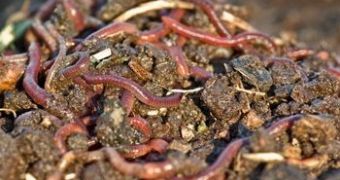According to a new study published in the Journal of Environment and Waste Management, earthworms can successfully be used to bring down the toxicity levels of solid waste, primarily because they do an excellent job in soaking up cadmium and lead.
Therefore, urban waste coming both from domestic sources and from vegetable and flower markets can be used to make compost, instead of simply having it thrown away in various sites located on the outskirts of cities and human communities.
As researchers working with the Department of Ecology and Environmental Sciences at Pondicherry University, India explain, three earthworm species are particularly efficient in collecting toxic heavy metals and making it possible for said organic waste to be turned into compost and used to fertilize crops.
The three worm species are the Eudrilus eugeniae, the Eisenia fetida and the Perionyx excavates.
Of these, the Eudrilus eugeniae has been found to be the most efficient, meaning that it managed to cut down on the quantities of toxic heavy metals found in solid waste by as much as three quarters in a relatively short period of time, and that the resulting compost was safe to use in the agricultural industry.
E! Science informs us that the scientists who carried out this research explain that, because of the make-up of their digestive systems, worms can detach heavy metal ions from rotting waste.
Furthermore, these earthworms produce very specific enzymes which act in the direction of locking up these harmful chemical compounds within the animal's cells and tissues, which means that once an earthworm finds itself engorged by heavy metals, it simply stays that way even after it dies.
Seeing how the expansion of urban human society also increases the need for our finding appropriate ways of dealing with organic waste, the fact that this resource might be put to better use thanks to earthworms comes as a particularly encouraging piece of news.

 14 DAY TRIAL //
14 DAY TRIAL //